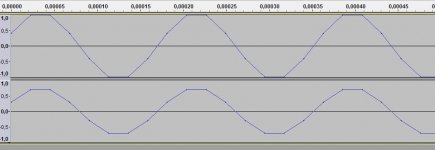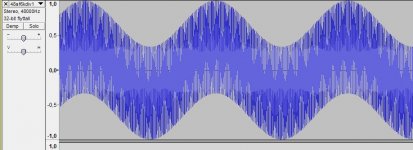I compared directly side-to-side with the NAD M51, the smaller Weiss DAC2 and the internal DAC from the DEQX HDP-3.
Only thing i can say is: that Weiss DAC1 mk3 is one hell of a beast. I understand why the pro sound guys love it that much.
But I haven't seen your score for the Weiss? The NAD was at the top with 8/10? From its description the M51 is very similar to Mola-Mola... But I think I would prefer something from Ayre.
'Bad implementation' aka 'multibit without enough bits'. AD1955 is delta-sigma, I think using 5bit DAC.
These guys also call it a Sigma Delta, what gives is it hybrid?
DAC PCM 1704 : High end audio dac | Digital to analog converter | Audiophile dac by LessLoss
Cheers George
Delta-sigma doesn't need to use 1bit, it just started out that way with Philips' 'Bitstream' and then DSD. Nowadays all the major DAC chip vendors are using multibit D-S (or S-D) - Cirrus/Wolfson, ADI, ESS, AKM, TI.
Ok so it is a Hybrid, they have a "bit" of a bet both ways, not one or the other. Is it still cheaper to manufacture than say a PCM1704?
Cheers George
Cheers George
Way cheaper, yes. Because with a 5 bit DAC you don't need to go for expensive laser trimming - the resistor values are already close enough to get 32 distinct levels out. Then you have to use signal processing to turn all the resistor value errors into noise. They'd otherwise show up as distortion.
But I haven't seen your score for the Weiss? The NAD was at the top with 8/10? From its description the M51 is very similar to Mola-Mola... But I think I would prefer something from Ayre.
Updated on page 1.
I had to change most of the scores.
Now, between the Fiio and the Weiss DAC1 mk3, i think i have a pretty good idea of low and high scores 😎
I also had the opportunity to compare side-to-side the DAC1 mk3 to a dCS Debussy on... a pair of Sonus Faber Aida (!)
This time i was not able to decide which one is my preferred. Both extremely good, but quite different.
This time i was not able to decide which one is my preferred. Both extremely good, but quite different.
New DAC that will be tested: Gustard X20
regarded as one of the best ES9018 chip implementation, and also one of the best quality/price ratio.
regarded as one of the best ES9018 chip implementation, and also one of the best quality/price ratio.
An externally hosted image should be here but it was not working when we last tested it.
Would be interesting to know how these high end dacs handles +0dBFS signal like the ones enclosed. Test with scope. There should be no clipping.
Mind the volume if played on speakers or headphones. Up to +8dB over 0dBFS. Can "melt" tweeters!!
+0dBFS is important if the sound listened to is modern music from around 1996 and later or reissues from same period.
I think a lot of difference of sound of different dacs and codecs can be accounted for by such +0dBFS signals.
If classical/dynamic uncompressed music is used for comparing DACS, codecs, ASRC, encoders, decoders, this comment is not relevant, because the signal is never +0dBFS.
The original? paper on the subject from 2006:
http://www.tcelectronic.com/media/1013907/lund_2006_stop_counting_samples_aes121.pdf
Mind the volume if played on speakers or headphones. Up to +8dB over 0dBFS. Can "melt" tweeters!!
+0dBFS is important if the sound listened to is modern music from around 1996 and later or reissues from same period.
I think a lot of difference of sound of different dacs and codecs can be accounted for by such +0dBFS signals.
If classical/dynamic uncompressed music is used for comparing DACS, codecs, ASRC, encoders, decoders, this comment is not relevant, because the signal is never +0dBFS.
The original? paper on the subject from 2006:
http://www.tcelectronic.com/media/1013907/lund_2006_stop_counting_samples_aes121.pdf
Attachments
Last edited:
Fichtre bleu ! J'ai la Gustard qui me monte au nez 😉
I never eat them for lunch either!
Best Regards,
Terry
from head fi.
gustard x20 dac (900$) compared with ifi idsd (500$)
''
First impressions compared to iDSD Micro are:
- much more and deeper bass (like I bought a sub)
- highs quite sharp
- mids more recessed and not as sweet/analogue but more detailed
- more fatiguing after about 1h
DSD differences more obvious than PCM.
This is on a brand new X20 unit not run in.
''
would love to hear a full and comprehensive review. maybe use a good pair of headphones
gustard x20 dac (900$) compared with ifi idsd (500$)
''
First impressions compared to iDSD Micro are:
- much more and deeper bass (like I bought a sub)
- highs quite sharp
- mids more recessed and not as sweet/analogue but more detailed
- more fatiguing after about 1h
DSD differences more obvious than PCM.
This is on a brand new X20 unit not run in.
''
seriously, comparing dacs and including only the mid performance is almost pointless.New DAC that will be tested: Gustard X20
regarded as one of the best ES9018 chip implementation, and also one of the best quality/price ratio.
An externally hosted image should be here but it was not working when we last tested it.
would love to hear a full and comprehensive review. maybe use a good pair of headphones
Last edited:
Enclose in the next post is two soundfiles zipped.
44.1 samplefrequency and 48.0 samplefrequency.
The 48.0 sf wav file is
sine at 6k phase 22.5degrees ampl 1.08 +
sine at 60 phase 22.5degrees ampl 1.00 +
sine at 0.6 phase 22.5degrees ampl 1.00
That means no samples over +/-1.00000
Top values at +0.67dbFS
This is more like overcompressed music.
The signal will produce artifacts and distortion that is easily heard if the chain don't treat +0dBFS signals with grace.
BE CAREFUL WITH THE VOLUME AND YOUR EARS!!!!! Attunate 40dB or more before speakers.
The other file is 44.1kHz samplerate, signal scaled to 5k5125. The same artifacts should be heard or the chain is OK regarding +0dBFS signals.
I think the cain should also be able to handle these signals played with no digital attunation at the source.
Regards Torgeir
44.1 samplefrequency and 48.0 samplefrequency.
The 48.0 sf wav file is
sine at 6k phase 22.5degrees ampl 1.08 +
sine at 60 phase 22.5degrees ampl 1.00 +
sine at 0.6 phase 22.5degrees ampl 1.00
That means no samples over +/-1.00000
Top values at +0.67dbFS
This is more like overcompressed music.
The signal will produce artifacts and distortion that is easily heard if the chain don't treat +0dBFS signals with grace.
BE CAREFUL WITH THE VOLUME AND YOUR EARS!!!!! Attunate 40dB or more before speakers.
The other file is 44.1kHz samplerate, signal scaled to 5k5125. The same artifacts should be heard or the chain is OK regarding +0dBFS signals.
I think the cain should also be able to handle these signals played with no digital attunation at the source.
Regards Torgeir
Attachments
Last edited:
Some interesting and practical articles fro Keith Armstrong on EMC, may have to register but worth it as they are less maths based than Henry Ott and Ralph Morrisons stuff.
EMC Information Centre
Why is it when PC noise is discussed its always the SMPS that's the bad boy.... maybe looking at simultaneous switching noise would enlighten many on where the noise comes from. I have seen a digital systems with a linear supply that was no different in noise spectrum than when a SMPS was used, in fact the SMPS was better because there was less noise in the audio frequency range and filters were smaller and easier to implement. I know of headphones with SMPS in the ear shell (2 in fact, one for battery charging and one for powering the active noise cancellation) no problems with noise.
EMC Information Centre
Why is it when PC noise is discussed its always the SMPS that's the bad boy.... maybe looking at simultaneous switching noise would enlighten many on where the noise comes from. I have seen a digital systems with a linear supply that was no different in noise spectrum than when a SMPS was used, in fact the SMPS was better because there was less noise in the audio frequency range and filters were smaller and easier to implement. I know of headphones with SMPS in the ear shell (2 in fact, one for battery charging and one for powering the active noise cancellation) no problems with noise.
If classical/dynamic uncompressed music is used for comparing DACS, codecs, ASRC, encoders, decoders, this comment is not relevant, because the signal is never +0dBFS.
http://www.tcelectronic.com/media/1013907/lund_2006_stop_counting_samples_aes121.pdf
I have a lot of classical music from the last 2 years and almost all of it is normalised so the peak (for the disk) is within 0.1dB of FS. Plenty hits 0dBFS. So not sure what you are basing this statement on?
The +0dBFS files
Beware the volume!
Forgot I have also devided by 3...
The important code:
Dim Freq As Double = 6000 '5512.5
Dim SF As Double = 48000 '44100
Dim Phase As Double = 22.5
Dim Ampl As Double = 1.08
Dim Nmax As Integer = 10 * SF
LinSamples(i) =
Math.Sin((i * Freq / SF + Phase / 360) * 2 * Math.PI) * Ampl +
Math.Sin((i * (Freq / 100) / SF + Phase / 360) * 2 * Math.PI) +
Math.Sin((i * (Freq / 10000) / SF + Phase / 360) * 2 * Math.PI)
LinSamples(i) = LinSamples(i) / 3
Last edited:
I have a lot of classical music from the last 2 years and almost all of it is normalised so the peak (for the disk) is within 0.1dB of FS. Plenty hits 0dBFS. So not sure what you are basing this statement on?
I based it on a probably false assumption that classical recordings is less aggressivly compressed....
But It is no problem if the (analog) top of the waveform hits 0dBFS.
Have not found a program that shows if a waveform is actually +0dBFS or not.
Ok so it is a Hybrid, they have a "bit" of a bet both ways, not one or the other. Is it still cheaper to manufacture than say a PCM1704?
Cheers George
George,
DAC's these days are mostly low bit DS.
The OP DAC's are usually unity weighted multi bit. For example each Sabre
OP phase has 64 x 50k resistors. So in stereo mode that is 64 x 4 = 256 x
50k resistors switching on / off at very high speed.
The reason they went to this was both cost and for measured performance.
There's no way an R2R can be made to give the measured performance of
DAC such as Sabre. Much greater DR (>130dB) and very low distortion.
How this relates to subjective performance is an entirely different matter.
T
I recently heard Metronome Nausicaa at HiFi show 2015 in UK. it was part of a £100K+ system. Obviously it sounded superb, but how much of it was down to the Metronome, I couldn't comment.
Down to realistic prices (upto £3K) I have heard a few in my system, and finally settled for Leema Acoustics Elements DAC.
Nothing is perfect, neither is the Leema, but for the money (and in my system) it sounded the most musical.
Check it out.
Down to realistic prices (upto £3K) I have heard a few in my system, and finally settled for Leema Acoustics Elements DAC.
Nothing is perfect, neither is the Leema, but for the money (and in my system) it sounded the most musical.
Check it out.
Last edited:
- Home
- Member Areas
- The Lounge
- World's Best DAC's





